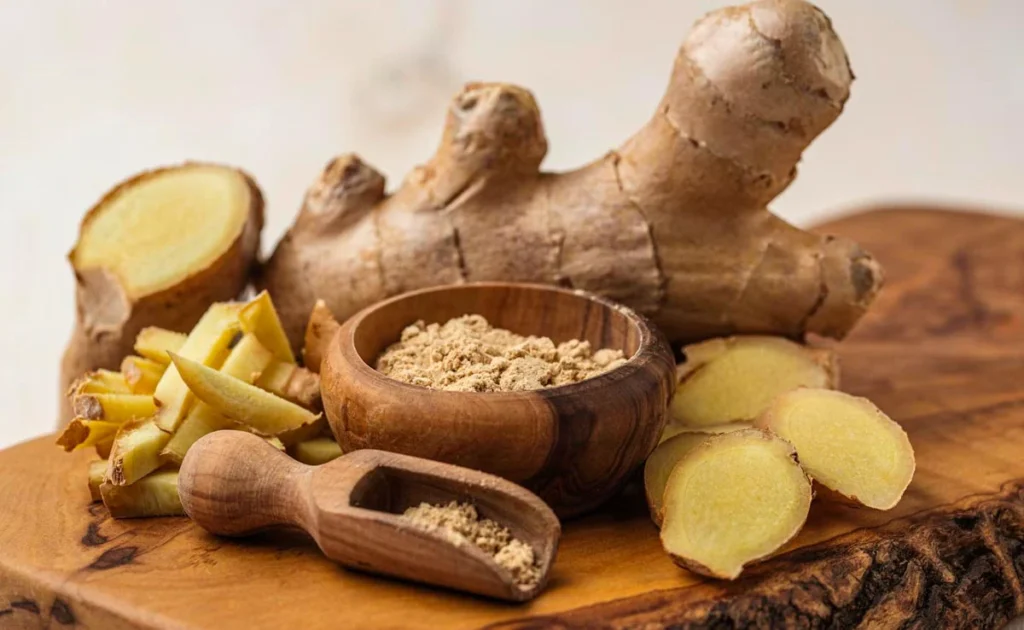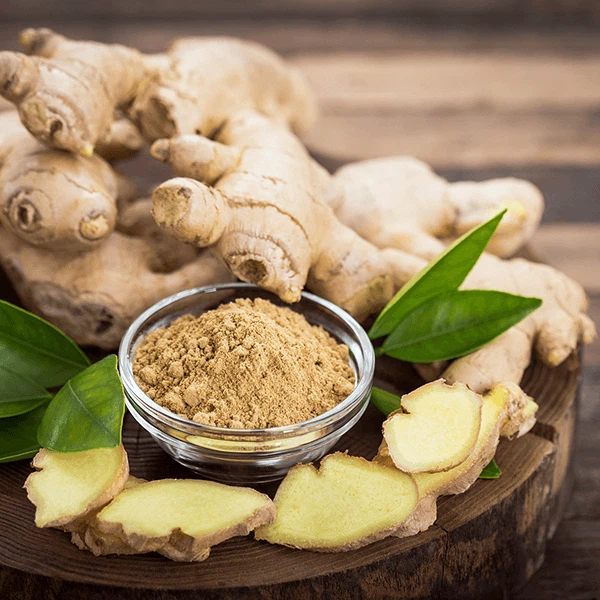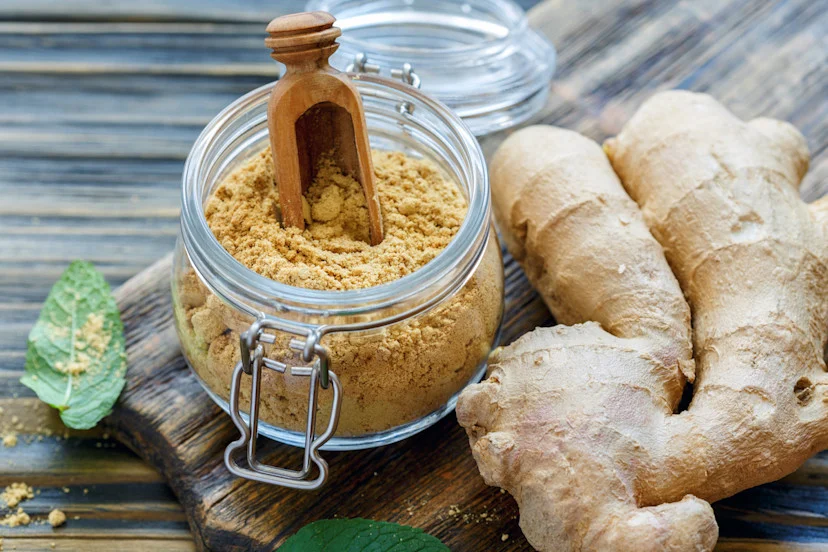Está de pie en la cocina, con la receta en la mano. O tal vez siente ese cosquilleo familiar en la garganta, señal de un resfriado inminente. Echas mano del jengibre, un remedio milenario y un ingrediente culinario básico. Pero entonces se detiene. ¿La raíz nudosa y fresca o el bote de polvo?
A todos nos han dicho alguna vez que "lo fresco es lo mejor", una regla sencilla e intuitivamente correcta. Pero cuando se trata del jengibre, esa sabiduría común es sólo la mitad de la historia. La verdad es mucho más compleja, científicamente fascinante y, en última instancia, más útil.

Esta es la guía definitiva -la única que necesitará- para zanjar el debate. Vamos a ir más allá de la opinión y sumergirnos en la ciencia verificable de los beneficios para la salud, el punto de vista matizado de un chef sobre el sabor, y el análisis de un comprador inteligente del valor del mundo real.
En primer lugar, para los que tengan prisa, he aquí el veredicto final en 30 segundos.
De un vistazo: Enfrentamiento entre el jengibre fresco y el jengibre en polvo
La elección entre el jengibre fresco y el jengibre en polvo no tiene que ver con cuál es universalmente "mejor", sino con cuál es específicamente mejor para su objetivo. Esta tabla desglosa las principales diferencias para ayudarle a tomar siempre la decisión correcta.
| Característica | Jengibre fresco | Jengibre en polvo |
|---|---|---|
| Compuesto activo primario | Gingerol | Shogaol (Formado durante el proceso de secado) |
| Perfil de sabor | Agudo, picante, con notas cítricas. | Cálido, terroso, dulce-picante, con profundas "notas de fondo". |
| Lo mejor para los objetivos de salud | Problemas agudos: resfriados, náuseas, indigestión inmediata | Problemas crónicos: inflamación, artritis, dolores musculares |
| Lo mejor para usos culinarios | Salteados, infusiones, adobos, sopas, platos de acabado | Pastelería (pasteles, galletas), condimentos, curry, salsas |
| Vida útil media | 2-3 semanas (refrigerado) | 1-2 años (almacenado en un lugar fresco y oscuro) |
| Coste real | Menor precio inicial, pero posibilidad de residuos | Mayor coste inicial, pero 100% utilizable con una larga vida útil |
Beneficios para la salud: ¿Es más potente fresco o en polvo?
Aquí es donde el debate se vuelve realmente interesante. La respuesta no es un simple sí o no; depende totalmente de su objetivo de salud, ya que la composición química del jengibre cambia drásticamente cuando se seca.
La ventaja del jengibre fresco: el poder inmediato del gingerol
La raíz fresca de jengibre es rica en un compuesto bioactivo llamado gingerol. Esta es la fuente principal de su penetrante sabor y de sus bien documentadas propiedades medicinales. El gingerol es una fuente de energía para tratar problemas agudos e inmediatos. Es famoso por su capacidad para calmar el malestar estomacal, aliviar las náuseas (desde el mareo matutino hasta el mareo por movimiento) y combatir el resfriado común. Piense en él como el equipo de primera respuesta del jengibre.
El poder oculto del polvo: por qué el secado crea shogaoles superpotentes
He aquí el aspecto crucial que la mayoría de los artículos pasan por alto: el secado del jengibre no es sólo una cuestión de conservación; es una transformación. Durante el proceso de deshidratación, los gingeroles sufren una reacción química y se convierten en compuestos llamados shogaols.
Y aquí está el cambio de juego: la investigación científica ha demostrado que los shogaoles pueden ser incluso más potentes que los gingeroles en ciertos aspectos. Un estudio publicado en la revista Cartas de Química Bioorgánica y Medicinalpor ejemplo, descubrieron que el [6]-shogaol presenta potentes efectos antiinflamatorios y anticancerígenos, en algunos casos superiores a los de su homólogo fresco.
No piense en ello como una pérdida de nutrientes, sino como una conversión en un arma más específica contra la inflamación crónica y el dolor. Esto hace que el jengibre en polvo de alta calidad sea una opción excepcional para tratar afecciones inflamatorias a largo plazo como la artritis.
Su objetivo de salud
Para simplificar, utilice este cuadro para hacer su elección:
| Si su objetivo es... | La mejor opción es... | Porque... |
|---|---|---|
| Calmar las náuseas o el malestar estomacal | Jengibre fresco | Su alto contenido en gingerol proporciona un alivio de acción rápida. |
| Combatir un resfriado o una gripe | Jengibre fresco | El gingerol posee potentes propiedades antimicrobianas y antivirales. |
| Reducción de la inflamación crónica (por ejemplo, artritis) | Jengibre en polvo | Tiene más shogaoles, que son potentes agentes antiinflamatorios. |
| Aliviar el dolor muscular | Jengibre en polvo | Los efectos antiinflamatorios de los shogaoles ayudan a reducir las agujetas de aparición retardada. |
La Elección del Chef: El jengibre perfecto para sus recetas
En la cocina, la diferencia entre el jengibre fresco y el jengibre en polvo es la misma que entre un foco y la iluminación ambiental. Cada una tiene su función, y un chef experto sabe exactamente cuándo usar cada una.
Profundización en el sabor: Por qué la pólvora destaca en la repostería y las mezclas de especias
Pensemos en el sabor en términos musicales. El jengibre fresco proporciona el "notas altas"-un toque brillante, picante y fuertemente penetrante que destaca entre los demás ingredientes. Es perfecto para cuando se desea que el sabor del jengibre sea distintivo y vibrante, como en un salteado, una salsa final o una taza de té humeante.
El jengibre en polvo, por su parte, proporciona la "notas-base". Su sabor es más cálido, dulce y terroso. No grita; armoniza. Precisamente por eso es la estrella de la repostería (como el pan de jengibre o la tarta de calabaza) y de los aliños de especias. Su fina textura se integra a la perfección, proporcionando una calidez profunda y consistente sin la textura fibrosa ni la nitidez abrumadora de la raíz fresca. Además, el jengibre fresco introduce agua en la receta, lo que puede alterar la delicada química de los productos horneados.
Guía de sustitución infalible
En caso de apuro, se puede sustituir uno por otro, pero hay que tener en cuenta sus diferentes potencias y propiedades.
La Regla de Oro: 1/4 cucharadita de jengibre en polvo ≈ 1 cucharada de jengibre fresco rallado
Advertencia crucial para los panaderos: Cuando sustituya el jengibre fresco por jengibre en polvo en una receta de repostería, tenga en cuenta la humedad adicional. Es posible que tenga que reducir ligeramente otro líquido de la receta para mantener la textura deseada.

Guía del comprador inteligente: Maximizar el valor, minimizar el despilfarro
Más allá de la salud y el sabor, consideraciones prácticas como el coste y el almacenamiento a menudo determinan la decisión final. A continuación te explicamos cómo comprar jengibre de forma inteligente.
El coste real del jengibre: Desglose del coste por uso
Un trozo grande de jengibre fresco puede parecer más barato en la caja, pero tiene costes ocultos. Se pierde una parte al pelarlo y es habitual encontrar un trozo olvidado y arrugado en el fondo de la nevera.
Hagamos unos cálculos sencillos: Si compras un trozo de jengibre fresco de $2 pero acabas tirando 30%, tu coste real por la parte que has utilizado se acerca más a $2,85. Compárelo con un tarro de $5 de jengibre orgánico en polvo que es 100% aprovechable y dura más de un año. A menudo, el coste por uso del polvo de alta calidad es significativamente inferior.
El protocolo definitivo para almacenar jengibre
- Jengibre fresco: Para un uso a corto plazo (1-2 semanas), guarde la raíz sin pelar en una bolsa resellable en el cajón de verduras del frigorífico. Para un almacenamiento a largo plazo, pela la raíz, trocéala o rállala y congélala en un recipiente hermético o en una cubitera.
- Jengibre en polvo: La clave está en protegerlo del calor, la luz y la humedad. Guárdelo en un tarro de cristal herméticamente cerrado en un armario fresco y oscuro o en un cajón para especias. Un jengibre molido de alta calidad conservará su potencia durante al menos uno o dos años.
¿Es necesario gastar más en productos ecológicos?
Como el jengibre es una hortaliza de raíz que crece bajo tierra, es más susceptible de absorber pesticidas y metales pesados del suelo. Aunque la elección es personal, si su presupuesto se lo permite, optar por el jengibre ecológico -tanto fresco como en polvo- es una inversión que merece la pena para minimizar su exposición a sustancias químicas no deseadas.
Respuestas a sus principales preguntas (FAQ)
P: ¿Cuál es la mejor forma de preparar té de jengibre medicinal?
R: Para el resfriado, utiliza jengibre fresco. Corta en rodajas finas un trozo de una pulgada (no hace falta pelarlo si es orgánico), hiérvelo a fuego lento en agua durante 10-15 minutos, luego añade limón y miel. Para obtener beneficios antiinflamatorios, puede simplemente disolver de 1/4 a 1/2 cucharadita de jengibre en polvo de alta calidad en agua caliente.
P: ¿Puedo mezclar jengibre fresco y en polvo en un mismo plato?
R: ¡Por supuesto! Se trata de una técnica avanzada utilizada por los chefs. Pueden utilizar jengibre en polvo en una base de curry para darle un calor profundo y fundamental, y luego añadir un poco de jengibre fresco rallado al final para darle un toque final de aroma picante.
P: ¿Cómo puedo saber si mi jengibre en polvo sigue siendo potente?
R: Usa la nariz. Abra el tarro y huélalo. Un polvo de jengibre potente debe tener un aroma claramente cálido, picante y acre. Si huele débil, polvoriento o a nada en absoluto, ha perdido su potencia y debe ser sustituido.
La recomendación final: Su estrategia perfecta para el jengibre
No hay un único ganador en el debate entre el jengibre fresco y el jengibre en polvo. Lo realmente inteligente es reconocer que se trata de dos ingredientes diferentes con dos funciones distintas.
Esta es tu nueva estrategia:
Tenga en su despensa jengibre en polvo ecológico de alta calidad. Utilícelo por sus potentes y duraderos beneficios antiinflamatorios, para todas sus necesidades de repostería y como base de sabor fiable y sin residuos.
Compre jengibre fresco en pequeñas cantidades, según sea necesario. Utilícelo cuando le apetezca ese incomparable toque fresco y picante en sus tés, salteados y adobos.
Al adoptar ambos, equipas tu cocina y tu cuerpo con todo el increíble espectro de lo que el jengibre tiene que ofrecer.

